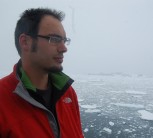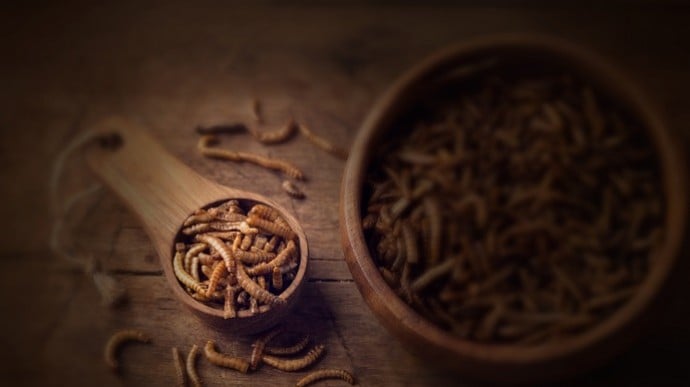Climate change and commercial fishing is putting Earth’s most southern waters – and the planet itself – at risk. UP macro-ecologist Dr Luis Pertierra has joined the global call to better protect the Southern Ocean by banning fishing in Antarctic waters, among other measures.
Adélie penguins (Pygoscelis adeliae) are a near-threatened species of penguin found only along the Antarctic coast.

Dr Luis Pertierra obtained his undergraduate degree in Environmental Science at the Autonomous University of Madrid in Spain. He has been a senior postdoctoral fellow at the University of Pretoria’s (UP) Department of Plant and Soil Sciences for the past 18 months.
His research focuses on biodiversity in the Southern Ocean, specifically the study of the biota of the Prince Edward Islands, and South Africa’s interests in the polar region. “I am doing my research at UP because my supervisor, Professor Michelle Greve, and I have a common interest and complementary set of skills in polar ecology,” he says.
His research contributes to the betterment of the world because it aims to protect the ecosystem services of polar biodiversity.
He says his research matters because the Antarctic region alone comprises one-sixth of the planet. The ecosystem services of the Southern Ocean and emerged lands in the Antarctic region are immense, and include global climate and biodiversity regulation; an array of cultural services such as scientific knowledge and bioprospecting; direct human life support such as sea level control; and living resources provisioning, namely fishing. However, these services still need to be fully valued and managed efficiently to guarantee a long-term sustainable provision of services to humankind.
Dr Pertierra is part of the ASICS Project, which is investigating the effects of climate change and invasive species in polar and alpine environments. ASICS stands for ASsessing and mitigating the effects of climate change and biological Invasions on the spatial redistribution of biodiversity in Cold environmentS, and is a global network of ecologists that is passionate about biodiversity in Earth’s most remote areas.
The ASICS South African division is led by Prof Greve, and researchers work closely with colleagues from French and other international institutions in their study of polar biodiversity redistribution.
In addition to his core work in the Department of Plant and Soil Sciences, Dr Pertierra collaborates with researchers at UP’s Centre for Microbial Ecology and Genomics, which is part of the Genomics Research Institute, to study the macro-ecological effects of global change on the microbiology of African soils.
He says that learning the science behind functional ecology studies has been a great addition to his portfolio. “I have been able to see the natural world with a new complementary perspective. I was recently involved in a research expedition to the sub-Antarctic Marion Island; I think the expedition will lead to numerous outcomes of value.”
Dr Pertierra says that Dr Greve has been a great inspiration to him in terms of pursuing quality science and embracing new computational and statistical skills, allowing him to reach new heights. As for academic role models, several researchers inspire him. He mentions Prof Pete Le Roux of the Department of Plant and Soil Sciences for “his vast knowledge on the functioning of polar ecosystems, his gentle ways and mentoring skills”.
Dr Pertierra hopes to contribute to the understanding, awareness and conservation of polar and global ecosystems. “In particular, I have a vested interest in the preservation of marine birds (penguins and seabirds), vegetation (vascular and non-vascular plants) and soil ecosystems fauna (invertebrates) from the arrival of non-native species in order to retain their ecosystem services but also to maintain their semi-pristine uniqueness for future generations, and to safeguard their scientific, heritage, landscape and recreational values.”
His advice to school learners or undergraduates who are interested in his field is to be passionate about their work and to find out how to contribute to the betterment of nature and modern society. “Think outside the box and try to see the big picture,” he urges. “We often fail to realise how connected our world is nowadays, so changes in remote parts, such as the poles, matter a lot, even for spatially distant societies. We are on the verge of irremediable ecosystem collapses, and we urgently need more decisive and non-conformist action. It is in your spirit to shape the world as you see fit.”
Dr Pertierra says he enjoys watching science fiction and dystopian movies, series and videogames in his spare time because “they allow me to explore the ‘what-ifs’. “I am also obsessed with nature photography and take any opportunity to visit the wilder areas of South Africa such as the Kruger National Park.” He is also an active reader of news on Twitter to ensure that stays on the pulse of environmental changes and can be found on his handle @luisrpertierra.
 Story
Story
Cricket à la king? How about a yellow mealworm burger? Foods that may previously have evoked a ‘yuck’ response are now firmly on the menu. Research into edible insects by the Department of Zoology and Entomology at the University of Pretoria (UP) is exploring how to rear and harvest this food of the future.
 Story
Story
Generative artificial intelligence (GenAI) is changing how we work, play and relax. Whether you use ChatGPT to write a brief, Midjourney to generate visuals or MuseNet to create unique soundtracks, these technologies have opened up opportunities for richer content.
 Story
Story
A single query to ChatGPT uses as much electricity as burning a light bulb for about 20 minutes. Multiply that by the millions of requests that this artificial intelligence (AI) chatbot receives each day, and the environmental impact is ominous.
Copyright © University of Pretoria 2025. All rights reserved.
Get Social With Us
Download the UP Mobile App